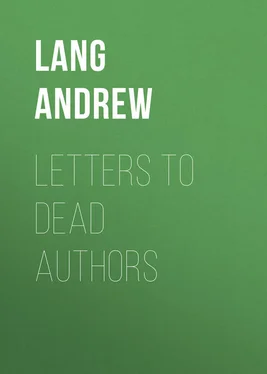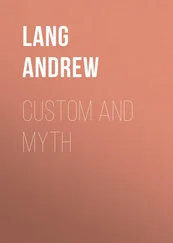Andrew Lang - Letters to Dead Authors
Здесь есть возможность читать онлайн «Andrew Lang - Letters to Dead Authors» — ознакомительный отрывок электронной книги совершенно бесплатно, а после прочтения отрывка купить полную версию. В некоторых случаях можно слушать аудио, скачать через торрент в формате fb2 и присутствует краткое содержание. Жанр: foreign_antique, foreign_prose, на английском языке. Описание произведения, (предисловие) а так же отзывы посетителей доступны на портале библиотеки ЛибКат.
- Название:Letters to Dead Authors
- Автор:
- Жанр:
- Год:неизвестен
- ISBN:нет данных
- Рейтинг книги:4 / 5. Голосов: 1
-
Избранное:Добавить в избранное
- Отзывы:
-
Ваша оценка:
- 80
- 1
- 2
- 3
- 4
- 5
Letters to Dead Authors: краткое содержание, описание и аннотация
Предлагаем к чтению аннотацию, описание, краткое содержание или предисловие (зависит от того, что написал сам автор книги «Letters to Dead Authors»). Если вы не нашли необходимую информацию о книге — напишите в комментариях, мы постараемся отыскать её.
Letters to Dead Authors — читать онлайн ознакомительный отрывок
Ниже представлен текст книги, разбитый по страницам. Система сохранения места последней прочитанной страницы, позволяет с удобством читать онлайн бесплатно книгу «Letters to Dead Authors», без необходимости каждый раз заново искать на чём Вы остановились. Поставьте закладку, и сможете в любой момент перейти на страницу, на которой закончили чтение.
Интервал:
Закладка:
II.
To Charles Dickens
Sir, – It has been said that every man is born a Platonist or an Aristotelian, though the enormous majority of us, to be sure, live and die without being conscious of any invidious philosophic partiality whatever. With more truth (though that does not imply very much) every Englishman who reads may be said to be a partisan of yourself or of Mr. Thackeray. Why should there be any partisanship in the matter; and why, having two such good things as your novels and those of your contemporary, should we not be silently happy in the possession? Well, men are made so, and must needs fight and argue over their tastes in enjoyment. For myself, I may say that in this matter I am what the Americans do not call a “Mugwump,” what English politicians dub a “superior person” – that is, I take no side, and attempt to enjoy the best of both.
It must be owned that this attitude is sometimes made a little difficult by the vigour of your special devotees. They have ceased, indeed, thank Heaven! to imitate you; and even in “descriptive articles” the touch of Mr. Gigadibs, of him whom “we almost took for the true Dickens,” has disappeared. The young lions of the Press no longer mimic your less admirable mannerisms – do not strain so much after fantastic comparisons, do not (in your manner and Mr. Carlyle’s) give people nick-names derived from their teeth, or their complexion; and, generally, we are spared second-hand copies of all that in your style was least to be commended. But, though improved by lapse of time in this respect, your devotees still put on little conscious airs of virtue, robust manliness, and so forth, which would have irritated you very much, and there survive some press men who seem to have read you a little (especially your later works), and never to have read anything else. Now familiarity with the pages of “Our Mutual Friend” and “Dombey and Son” does not precisely constitute a liberal education, and the assumption that it does is apt (quite unreasonably) to prejudice people against the greatest comic genius of modern times.
On the other hand, Time is at last beginning to sift the true admirers of Dickens from the false. Yours, Sir, in the best sense of the word, is a popular success, a popular reputation. For example, I know that, in a remote and even Pictish part of this kingdom, a rural household, humble and under the shadow of a sorrow inevitably approaching, has found in “David Copperfield” oblivion of winter, of sorrow, and of sickness. On the other hand, people are now picking up heart to say that “they cannot read Dickens,” and that they particularly detest “Pickwick.” I believe it was young ladies who first had the courage of their convictions in this respect. “Tout sied aux belles,” and the fair, in the confidence of youth, often venture on remarkable confessions. In your “Natural History of Young Ladies” I do not remember that you describe the Humorous Young Lady. 1 1 I am informed that the Natural History of Young Ladies is attributed, by some writers, to another philosopher, the author of The Art of Pluck .
She is a very rare bird indeed, and humour generally is at a deplorably low level in England.
Hence come all sorts of mischief, arisen since you left us; and it may be said that inordinate philanthropy, genteel sympathy with Irish murder and arson, Societies for Badgering the Poor, Esoteric Buddhism, and a score of other plagues, including what was once called Æstheticism, are all, primarily, due to want of humour. People discuss, with the gravest faces, matters which properly should only be stated as the wildest paradoxes. It naturally follows that, in a period almost destitute of humour, many respectable persons “cannot read Dickens,” and are not ashamed to glory in their shame. We ought not to be angry with others for their misfortunes; and yet when one meets the crétins who boast that they cannot read Dickens, one certainly does feel much as Mr. Samuel Weller felt when he encountered Mr. Job Trotter.
How very singular has been the history of the decline of humour! Is there any profound psychological truth to be gathered from consideration of the fact that humour has gone out with cruelty? A hundred years ago, eighty years ago – nay, fifty years ago – we were a cruel but also a humorous people. We had bull-baitings, and badger-drawings, and hustings, and prize-fights, and cock-fights; we went to see men hanged; the pillory and the stocks were no empty “terrors unto evil-doers,” for there was commonly a malefactor occupying each of these institutions. With all this we had a broad-blown comic sense. We had Hogarth, and Bunbury, and George Cruikshank, and Gilray; we had Leech and Surtees, and the creator of Tittlebat Titmouse; we had the Shepherd of the “Noctes,” and, above all, we had you .
From the old giants of English fun – burly persons delighting in broad caricature, in decided colours, in cockney jokes, in swashing blows at the more prominent and obvious human follies – from these you derived the splendid high spirits and unhesitating mirth of your earlier works. Mr. Squeers, and Sam Weller, and Mrs. Gamp, and all the Pickwickians, and Mr. Dowler, and John Browdie – these and their immortal companions were reared, so to speak, on the beef and beer of that naughty, fox-hunting, badger-baiting old England, which we have improved out of existence. And these characters, assuredly, are your best; by them, though stupid people cannot read about them, you will live while there is a laugh left among us. Perhaps that does not assure you a very prolonged existence, but only the future can show.
The dismal seriousness of the time cannot, let us hope, last for ever and a day. Honest old Laughter, the true lutin of your inspiration, must have life left in him yet, and cannot die; though it is true that the taste for your pathos, and your melodrama, and plots constructed after your favourite fashion (“Great Expectations” and the “Tale of Two Cities” are exceptions) may go by and never be regretted. Were people simpler, or only less clear-sighted, as far as your pathos is concerned, a generation ago? Jeffrey, the hard-headed shallow critic, who declared that Wordsworth “would never do,” cried, “wept like anything,” over your Little Nell. One still laughs as heartily as ever with Dick Swiveller; but who can cry over Little Nell?
Ah, Sir, how could you – who knew so intimately, who remembered so strangely well the fancies, the dreams, the sufferings of childhood – how could you “wallow naked in the pathetic,” and massacre holocausts of the Innocents? To draw tears by gloating over a child’s death-bed, was it worthy of you? Was it the kind of work over which our hearts should melt? I confess that Little Nell might die a dozen times, and be welcomed by whole legions of Angels, and I (like the bereaved fowl mentioned by Pet Marjory) would remain unmoved.
She was more than usual calm,
She did not give a single dam,
wrote the astonishing child who diverted the leisure of Scott. Over your Little Nell and your Little Dombey I remain more than usual calm; and probably so do thousands of your most sincere admirers. But about matter of this kind, and the unseating of the fountains of tears, who can argue? Where is taste? where is truth? What tears are “manly, Sir, manly,” as Fred Bayham has it; and of what lamentations ought we rather to be ashamed? Sunt lacrymæ rerum ; one has been moved in the cell where Socrates tasted the hemlock; or by the river-banks where Syracusan arrows slew the parched Athenians among the mire and blood; or, in fiction, when Colonel Newcome says Adsum , or over the diary of Clare Doria Forey, or where Aramis laments, with strange tears, the death of Porthos. But over Dombey (the Son), or Little Nell, one declines to snivel.
Читать дальшеИнтервал:
Закладка:
Похожие книги на «Letters to Dead Authors»
Представляем Вашему вниманию похожие книги на «Letters to Dead Authors» списком для выбора. Мы отобрали схожую по названию и смыслу литературу в надежде предоставить читателям больше вариантов отыскать новые, интересные, ещё непрочитанные произведения.
Обсуждение, отзывы о книге «Letters to Dead Authors» и просто собственные мнения читателей. Оставьте ваши комментарии, напишите, что Вы думаете о произведении, его смысле или главных героях. Укажите что конкретно понравилось, а что нет, и почему Вы так считаете.












